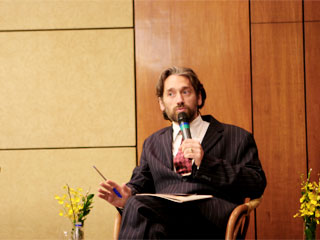Reviewing values to save the climate
Companies should change their production and consuming patterns and be more careful with the carbon offset projects
A review in the human values and change in production and consuming standards were the main points raised by the theme panel “Climate changes: ways to face this dilemma – companies, public power and consumers”, held at the Instituto Ethos’ 2007 Conference. Gilvan Sampaio, researcher at Centro de Previsão de Tempo e Estudos Climáticos (CPTEC) - Instituto Nacional de Pesquisas Espaciais – INPE, warned that climate change is not something for thirty years ahead; it is taking place now.” Besides the increase in greenhouse gas concentration in the atmosphere, Sampaio showed that, wherever we look, everything has increased in the Western societies after the mid 20th Century: population, pollutants emission, water and energy consumption, the number of tourists, etc. “This leads to a change in lifestyle. What we have today is a society that uses too much energy,” said Sampaio.
Fábio Feldmann, executive secretary of the São Paulo Forum on Climate Change and Biodiversity and panel moderator, demanded the return of the protagonism that always characterized Brazil in the global climate change agreements, and argued that the business sector should be called to discuss the greenhouse gas emission reduction targets. “The negotiations on reduction targets are being made like in the 19th Century, through agreements among countries. Companies and the civil society must also be called to participate,” said Feldmann.
According to Claude Ouimet, vice president and general manager of InterfaceFLOR Commercial for Canada and Latin America, companies really have a lot to do. Ouimet suggests that all companies evaluate the life cycle of their products so they can have an idea of the environmental impact of what they sell – and, then, change processes and products to cause the least possible damage. “Companies must be part of the solution, not of the problem,” said Ouimet.
Giovanni Barontini, co-owner of sustainability consulting firm Fábrica Éthica Brasil, protested strongly against the fashion of carbon offsetting by planting trees, for he considers many of these projects to be fake ones. “Countless companies reach the newspaper headlines because of this offsetting, but they don’t even make an inventory of their emissions,” he argued. In other words, if the company does not even know how much greenhouse gas it emits, how can it calculate how much has to be neutralized? “It’s necessary to know if there is fraud in these carbon offsetting projects,” said Barontini, anticipating the establishment of “a surveillance authority” for external control. Claude Ouimet, of InterfaceFLOR, agreed. In his company, according to him, only auditable environmental impact reduction projects are implemented.
“Carbon offsetting mustn’t be merely advertising. It has to be part of a company’s climate change policy that integrates the social responsibility strategy,” said Giovanni Barontini. He believes a “carbon offsetting that doesn’t neutralize anything” is, in the first place, an ethical question, for it will not help lower global warming levels, whose impact “will bring a lot of suffering in the future.” He cited the Carbon Disclosure Project (www.cdproject.net) as a reliable source of information for the society and investors. The project aims to disclose the companies’ greenhouse gas emission data.
However, in order to strike at the root of the global warming problem, all the participants stressed the importance of reviewing production and consuming patterns – especially energy ones –, as well as the values that move mankind. Jacques Marcovicth, professor of Corporate Strategy and International Relations of the Universidade de São Paulo, believes in the arrival of a new generation of professionals that will develop “green” careers, or life projects coupling personal and professional satisfaction. “We must invest in human resources to organize reflection and action that can change the future,” said Marcovitch.
According to Gilvan Sampaio, of Inpe, consumption is an area where individual actions are important, but should be complemented by policies encouraging the reduction of greenhouse gas emissions, such as subsidies to more efficient products. “One example is the fluorescent lamps, which consume 80% less energy, but are ten times more expensive. If a person earns minimum wage, they’ll choose the cheapest,” said Sampaio.
About a change in values, Claude Ouimet told a nice example involving Ray Anderson, founder of InterfaceFLOR and leader of the process to make the company environmentally responsible, who owned two luxury cars, a Bentley and a Jaguar. Anderson changed them for a Toyota Prius, a hybrid car (powered by gas and electricity) that spends about half the fuel consumed by a car of the same size. “He says he feels better diffusing the values he believes in while driving a Prius than showing power and status with the luxury cars,” said Ouimet.
Fonte: Instituto Ethos

> Petrobras Watch the Petrobras coverage
© Copyright 2007, Instituto Ethos de Responsabilidade Social Empresarial. Todos os direitos reservados






